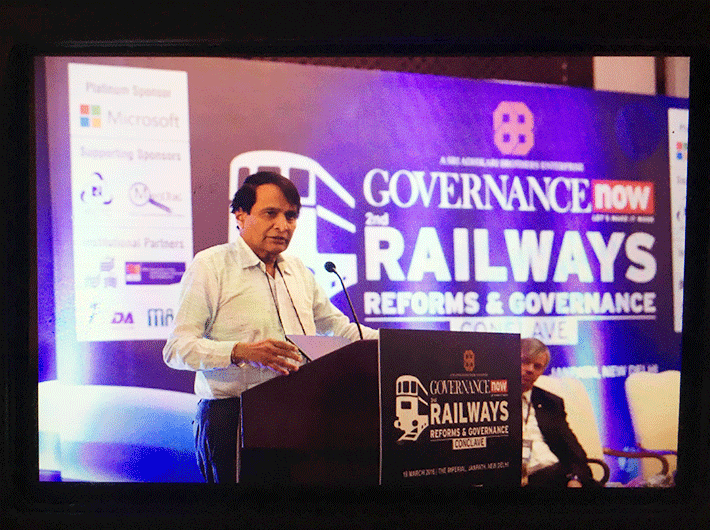Echoing the words of prime minister Narendra Modi, union railway minister Suresh Prabhakar Prabhu has said that the best example of ‘big bang reforms’ in India is in the railway sector. In the coming decades, railways will be a driving force in transforming the Indian economy.
“In the next phase of reforms in India, rail transport will be the fastest growing sector, though we haven’t made much investment for it. For the 2030 plan, we have to ensure that money is well spent in terms of governance and structure. An integrated IT solution will play an important role in monitoring this”, he added.
Speaking at Railways Reforms and Governance Conclave, organised by Governance Now, held in New Delhi on Friday, the minister said that governance will no longer be restricted to books. It is nothing more than improvement of services and delivery systems, and technology is playing an important role in this. “We have ambitious plans. Some of the many initiatives we have taken include the improvement in customer services, installation of electronic display system at all stations and availability of Wi-Fi”, he added.
He also said that public sector companies including IRCTC will contribute significantly in improving railway outreach and delivery services. In the case of railways, it will take at least two-three years for the results to come out.
Meanwhile, Vinit Goenka, member, IT taskforce, ministry of road transport and highways, talked about the technological intervention that has changed the face of railway reservation system. “As we go forward, can we make railway coaches into smart coaches, having Wi-Fi connectivity,” he said.
He also suggested converting various platforms into smart platforms having smart display with details of restaurants, rest rooms, among others.
Liu Jinsong, minister and deputy chief of mission, embassy of China, said, “As Indian economy gains speed against the backdrop of sluggish world economy, revitalisation of the railway network can be a driving force for economic growth.” China is ready to share its railway technologies, expertise and experience, especially in high speed railways, and work together with India for win-win results, Jinsong added.
Srikanth Karnakota, country head, Microsoft Cloud and Servers Business, compared Indian railways with lord Hanuman, who according to the Indian mythology, inherently possessed limitless potential but was unaware about it. He referred to the humungous amount of data being collected by the railways through passenger reservation and freight system, terming it as the biggest strength of the railways.
Karnakota also talked about the importance of Internet of Things, cloud technology and predictive analysis which can transform the sector.
Talking about the coach management systems being implemented by Center for railway information systems (CRIS), Sanjay Das, MD, CRIS, said, that they have started the system of bar coding at Nizamuddin railway station in New Delhi. He also said that one can book platform tickets in metropolitan cities on mobile phones. CRIS is planning to extend this service to other cities as well.
Sanjay Gupta, CMD, Konkan railways limited, said that being a public sector unit of Indian railways, the company faces same dilemmas as the railways. He informed the gathering that huge investments will be made in near future to increase the capacity of railways. He then asked a rhetorical question to the audience. “Should we focus on solving the social issues or make money?” To this he replied that as a PSU and being part of the railways their aim is to serve nation. “We will work for our country, whatever it takes,” he added.
Talking about the need for a dedicated freight corridor (DFC), Adesh Sharma, MD, Dedicated Freight Corridor Corporation of India, said that annually India loses $13 billion due to an inefficient transport sector. “It takes three to four days to transport freight from Delhi to Mumbai or Kolkata by road and two to three days by rail. 16 percent of the Indian railways lines carry 58 percent of the traffic,” he said. Therefore, there is an urgent need to expand capacity. He said that railways are an affordable mode of transport, besides being environmentally friendly. A DFC, he said that will increase the capacity of the railways from 36 percent to 50 percent. Moreover it will enable each train to carry 13,000 tonne of load and will take off three lakh lorries from the road. He added that the corridor will be complete by March 2018.
A K Manocha, CMD, IRCTC, said that the company is in the process of setting up 3,500 water vending machines that will bring down the cost of packaged drinking water from Rs 20 to Rs 5.
R K Bahuguna, CMD, Railtel, said that the revenue earned by the company is being utilised to improve the railway communications systems.
